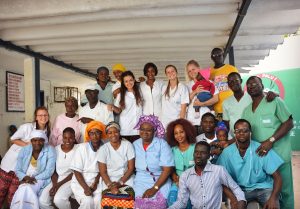Medical Volunteering Abroad: How to Contribute to Global Healthcare
Medical volunteering abroad is a unique opportunity to contribute to global health by providing medical care in areas where access to healthcare services is limited. Whether you are a doctor, nurse, pharmacist, or healthcare worker, these humanitarian missions allow you to use your skills to serve the most vulnerable populations. Discover how you can make a difference by participating in an international medical project and living a rewarding experience.
What is Medical Volunteering Abroad?
Medical volunteering abroad consists of providing medical services in countries where healthcare resources are limited. This can include missions in hospitals, health clinics, community health centers, or emergency missions after natural disasters. Medical volunteering helps to meet urgent needs and contributes to strengthening healthcare systems in areas where infrastructure is often insufficient.
Why Choose Medical Volunteering?
There are many reasons to engage in a medical mission abroad. First, it allows you to have a direct and tangible impact on the lives of people in need. As a healthcare professional, you will be able to provide care, organize prevention campaigns, and help resolve major health crises. Additionally, this experience will enrich your professional skills, enable you to work in unique conditions, and develop an intercultural perspective.

How to Participate in Medical Volunteering Abroad?
If you wish to engage in a medical volunteering project, here are the key steps to prepare:
1. Choose a Medical Volunteering Program
There are many organizations offering opportunities for medical volunteering abroad. Some are associations, while others work in partnership with governments or international organizations. Make sure to choose a recognized program that matches your skills and expectations. Consider the missions offered, the living conditions on-site, and the actual impact of the project on local communities.
2. Check Qualifications and Requirements
Requirements vary depending on the programs and countries. Some missions require specific qualifications, such as a degree in medicine, nursing, or pharmacy. Other programs also welcome volunteers with skills in project management, logistics, or health education. Ensure that your skills match the chosen mission and prepare for any necessary training.
3. Prepare for Your Medical Humanitarian Mission
Once you have chosen your mission, it is important to prepare well before leaving. This includes administrative preparation (obtaining a visa, health insurance, etc.), covering travel expenses, and understanding the cultural and logistical challenges you will face. Some organizations offer training or briefings to prepare you for the work environment, local customs, and the specific needs of the population.
4. Participate and Adapt to Local Conditions
When you arrive, you will need to adapt to working and living conditions that can sometimes be very different. Healthcare infrastructure may be limited, medical resources may be missing, and equipment is often rudimentary. However, your mission will be all the more valuable. You will work with local teams, often under pressure from emergency situations or health crises. Adaptability and resilience will be essential during your mission.

Types of Medical Missions Available
Medical missions abroad cover a wide range of projects, each with specific goals based on the needs of local communities. Here are some of the most common types of medical missions:
1. Emergency Medical Care
Emergency missions are often necessary after natural disasters, such as earthquakes, tsunamis, or epidemics. Medical volunteers intervene to provide emergency care, treat the injured, and prevent epidemics.
2. Primary Care and Prevention
Primary care missions focus on providing basic healthcare to local populations, especially in rural areas. These missions include managing common illnesses, vaccination, and health education.
3. Chronic Disease Management
In some parts of the world, care for chronic diseases (diabetes, hypertension, respiratory infections) is limited. Medical missions may include regular consultations, treatments, and awareness campaigns to help populations better manage their long-term health.
4. Training and Capacity Building Projects for Local Healthcare Workers
Medical missions are not just about providing care. They often include training programs for local healthcare workers. By training nurses, doctors, and technicians, missions contribute to strengthening the capacity of health systems in the long term.

Benefits of Medical Volunteering Abroad
Medical missions abroad offer numerous benefits, both for volunteers and for the communities they help. Here are some of the main benefits:
1. Make a Direct Impact
Medical missions offer the opportunity to save lives and improve the quality of life for people living in precarious conditions. As a volunteer, you will see the impact of your actions on a daily basis, whether through consultations, treatments, or prevention campaigns.
2. Develop Professional Skills
Working in sometimes difficult conditions will allow you to develop new skills and enhance the ones you already have. You will learn to work with limited resources, demonstrate creativity and innovation, and handle emergency situations.
3. Experience Intercultural Immersion
Medical volunteering abroad is also a unique opportunity to discover a different culture, immerse yourself in a new community, and learn new perspectives on health, care, and crisis management.
4. Expand Your Professional Network
Medical missions allow you to meet healthcare professionals from around the world. You will have the chance to build lasting relationships and expand your network in the medical field globally.
Challenges of Medical Volunteering
Although medical volunteering abroad is a rewarding experience, it also comes with its share of challenges. Here are some of the main challenges you might encounter:
1. Difficult Working Conditions
Medical missions often take place in precarious conditions. Infrastructure is limited, medical equipment is often insufficient, and emergency situations may be frequent. The ability to work under these conditions is crucial.
2. Cultural Shocks
Working in another country means adapting to a different culture. Social, religious, and professional norms may be very different from those you are accustomed to. It is important to prepare for these differences to maximize the impact of your mission.
3. Emotional Stress
Working in crisis or poverty-stricken situations can be emotionally taxing. Emotional support and stress management are crucial to staying effective and maintaining good mental health during your mission.

